Cross-Cultural Training for Expatriates and Multinational Corporations
VerifiedAdded on 2020/06/04
|14
|4702
|33
Report
AI Summary
This report examines the critical role of cross-cultural training (CCT) for expatriates working in multinational corporations (MNCs). It highlights the importance of CCT in enhancing cultural competence, facilitating effective global operations, and improving expatriate retention. The report discusses various CCT models, including general awareness training and country-specific training, and emphasizes the need for tailored programs. It evaluates the implications of CCT for MNCs, including improved communication, conflict resolution, and employee performance. A case study of Walmart's international operations illustrates how MNCs can leverage CCT to achieve their business objectives. The report also addresses the challenges and benefits associated with CCT, such as cost considerations and employee participation. Furthermore, it explores the link between international human resource management and CCT, emphasizing the need for HRM practices that address national differences. The report concludes by underscoring the value of CCT in fostering a competitive and adaptable workforce capable of navigating diverse cultural environments.
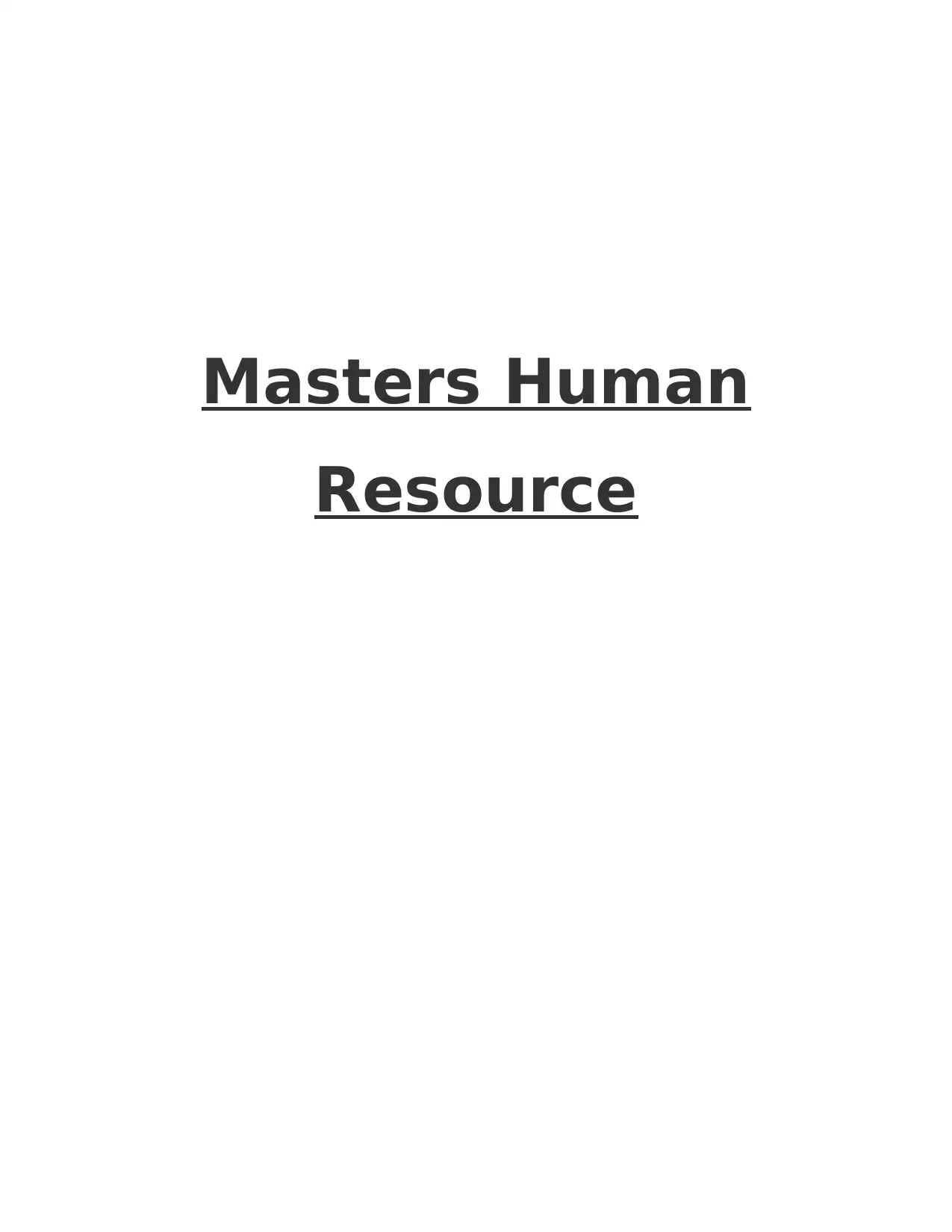
Masters Human
Resource
Resource
Paraphrase This Document
Need a fresh take? Get an instant paraphrase of this document with our AI Paraphraser
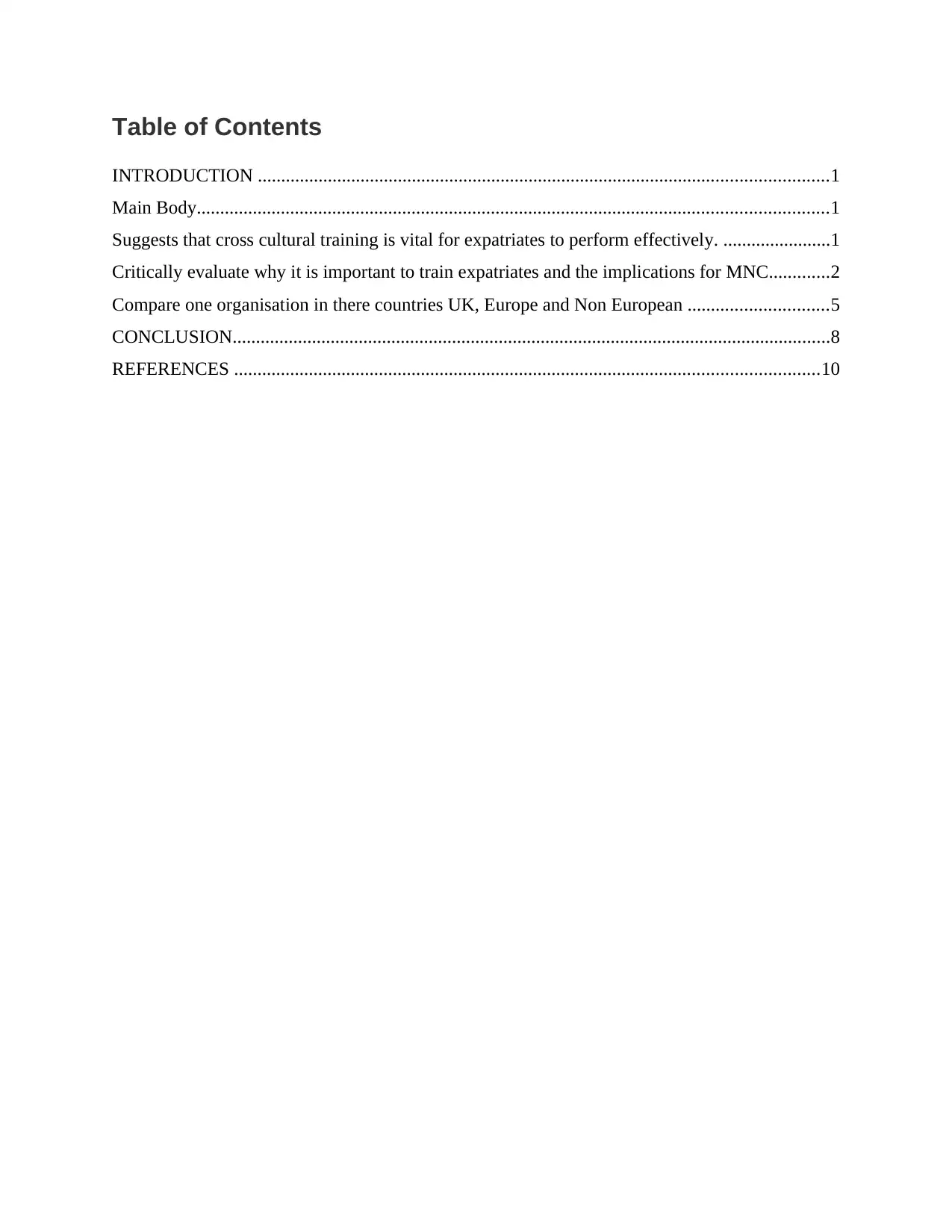
Table of Contents
INTRODUCTION ..........................................................................................................................1
Main Body.......................................................................................................................................1
Suggests that cross cultural training is vital for expatriates to perform effectively. .......................1
Critically evaluate why it is important to train expatriates and the implications for MNC.............2
Compare one organisation in there countries UK, Europe and Non European ..............................5
CONCLUSION................................................................................................................................8
REFERENCES .............................................................................................................................10
INTRODUCTION ..........................................................................................................................1
Main Body.......................................................................................................................................1
Suggests that cross cultural training is vital for expatriates to perform effectively. .......................1
Critically evaluate why it is important to train expatriates and the implications for MNC.............2
Compare one organisation in there countries UK, Europe and Non European ..............................5
CONCLUSION................................................................................................................................8
REFERENCES .............................................................................................................................10
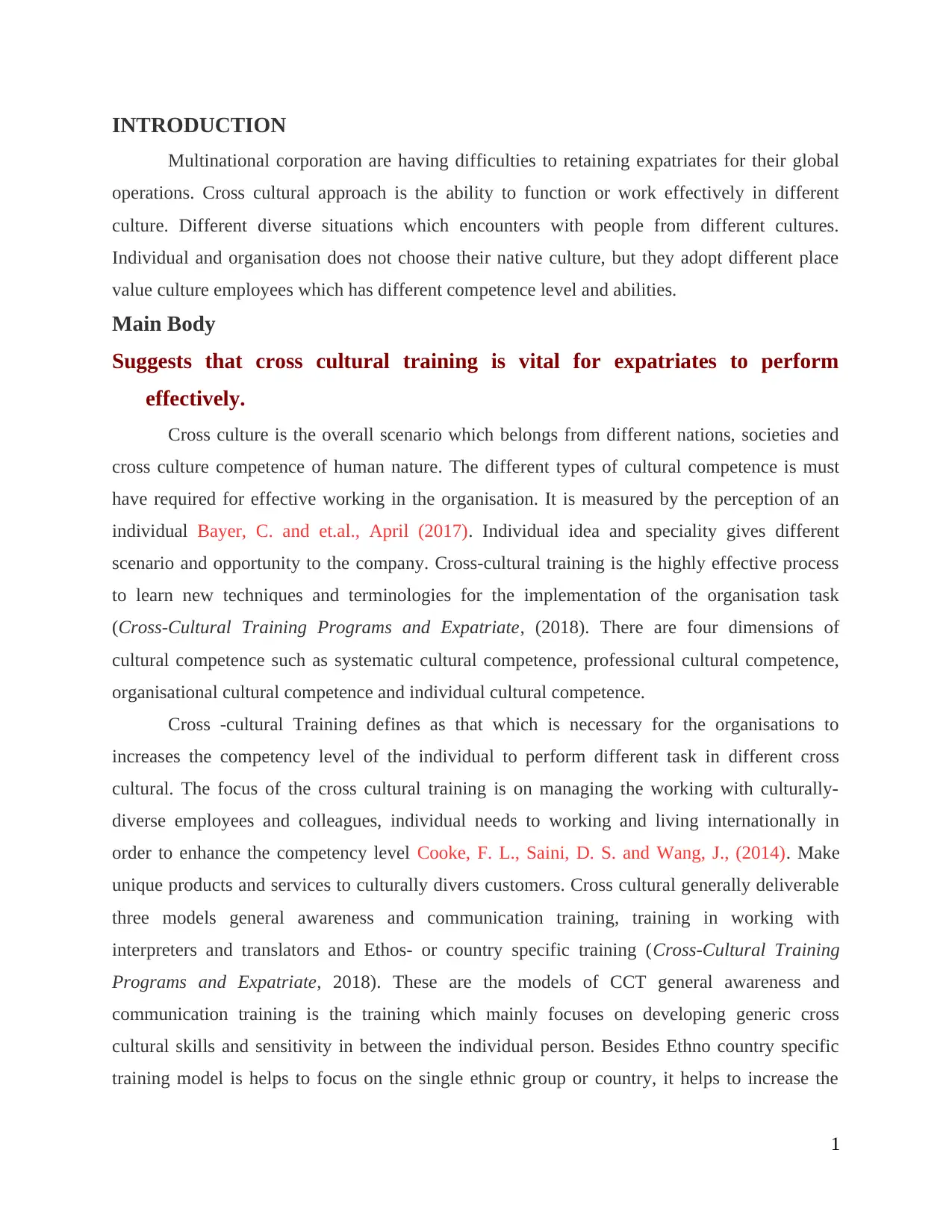
INTRODUCTION
Multinational corporation are having difficulties to retaining expatriates for their global
operations. Cross cultural approach is the ability to function or work effectively in different
culture. Different diverse situations which encounters with people from different cultures.
Individual and organisation does not choose their native culture, but they adopt different place
value culture employees which has different competence level and abilities.
Main Body
Suggests that cross cultural training is vital for expatriates to perform
effectively.
Cross culture is the overall scenario which belongs from different nations, societies and
cross culture competence of human nature. The different types of cultural competence is must
have required for effective working in the organisation. It is measured by the perception of an
individual Bayer, C. and et.al., April (2017). Individual idea and speciality gives different
scenario and opportunity to the company. Cross-cultural training is the highly effective process
to learn new techniques and terminologies for the implementation of the organisation task
(Cross-Cultural Training Programs and Expatriate, (2018). There are four dimensions of
cultural competence such as systematic cultural competence, professional cultural competence,
organisational cultural competence and individual cultural competence.
Cross -cultural Training defines as that which is necessary for the organisations to
increases the competency level of the individual to perform different task in different cross
cultural. The focus of the cross cultural training is on managing the working with culturally-
diverse employees and colleagues, individual needs to working and living internationally in
order to enhance the competency level Cooke, F. L., Saini, D. S. and Wang, J., (2014). Make
unique products and services to culturally divers customers. Cross cultural generally deliverable
three models general awareness and communication training, training in working with
interpreters and translators and Ethos- or country specific training (Cross-Cultural Training
Programs and Expatriate, 2018). These are the models of CCT general awareness and
communication training is the training which mainly focuses on developing generic cross
cultural skills and sensitivity in between the individual person. Besides Ethno country specific
training model is helps to focus on the single ethnic group or country, it helps to increase the
1
Multinational corporation are having difficulties to retaining expatriates for their global
operations. Cross cultural approach is the ability to function or work effectively in different
culture. Different diverse situations which encounters with people from different cultures.
Individual and organisation does not choose their native culture, but they adopt different place
value culture employees which has different competence level and abilities.
Main Body
Suggests that cross cultural training is vital for expatriates to perform
effectively.
Cross culture is the overall scenario which belongs from different nations, societies and
cross culture competence of human nature. The different types of cultural competence is must
have required for effective working in the organisation. It is measured by the perception of an
individual Bayer, C. and et.al., April (2017). Individual idea and speciality gives different
scenario and opportunity to the company. Cross-cultural training is the highly effective process
to learn new techniques and terminologies for the implementation of the organisation task
(Cross-Cultural Training Programs and Expatriate, (2018). There are four dimensions of
cultural competence such as systematic cultural competence, professional cultural competence,
organisational cultural competence and individual cultural competence.
Cross -cultural Training defines as that which is necessary for the organisations to
increases the competency level of the individual to perform different task in different cross
cultural. The focus of the cross cultural training is on managing the working with culturally-
diverse employees and colleagues, individual needs to working and living internationally in
order to enhance the competency level Cooke, F. L., Saini, D. S. and Wang, J., (2014). Make
unique products and services to culturally divers customers. Cross cultural generally deliverable
three models general awareness and communication training, training in working with
interpreters and translators and Ethos- or country specific training (Cross-Cultural Training
Programs and Expatriate, 2018). These are the models of CCT general awareness and
communication training is the training which mainly focuses on developing generic cross
cultural skills and sensitivity in between the individual person. Besides Ethno country specific
training model is helps to focus on the single ethnic group or country, it helps to increase the
1
⊘ This is a preview!⊘
Do you want full access?
Subscribe today to unlock all pages.

Trusted by 1+ million students worldwide
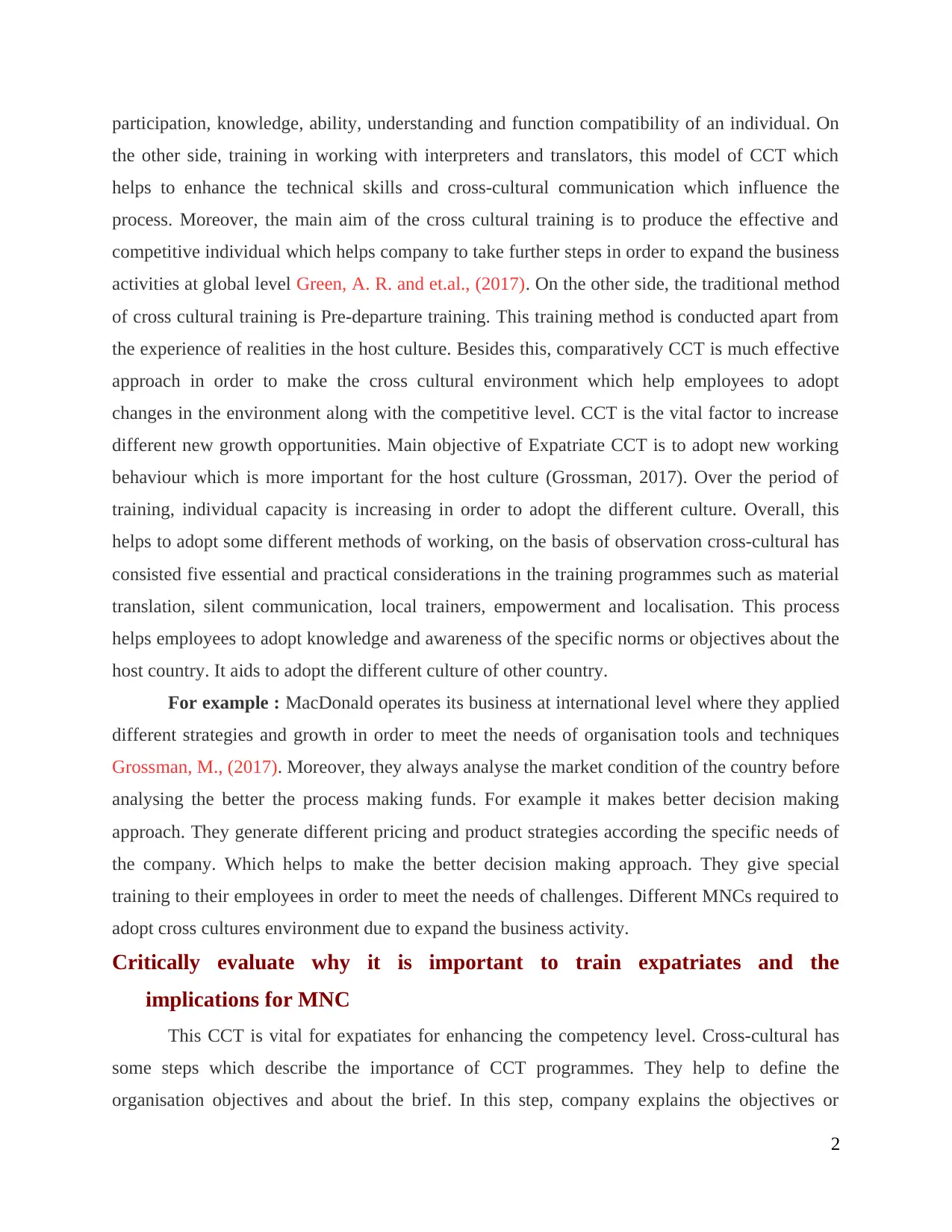
participation, knowledge, ability, understanding and function compatibility of an individual. On
the other side, training in working with interpreters and translators, this model of CCT which
helps to enhance the technical skills and cross-cultural communication which influence the
process. Moreover, the main aim of the cross cultural training is to produce the effective and
competitive individual which helps company to take further steps in order to expand the business
activities at global level Green, A. R. and et.al., (2017). On the other side, the traditional method
of cross cultural training is Pre-departure training. This training method is conducted apart from
the experience of realities in the host culture. Besides this, comparatively CCT is much effective
approach in order to make the cross cultural environment which help employees to adopt
changes in the environment along with the competitive level. CCT is the vital factor to increase
different new growth opportunities. Main objective of Expatriate CCT is to adopt new working
behaviour which is more important for the host culture (Grossman, 2017). Over the period of
training, individual capacity is increasing in order to adopt the different culture. Overall, this
helps to adopt some different methods of working, on the basis of observation cross-cultural has
consisted five essential and practical considerations in the training programmes such as material
translation, silent communication, local trainers, empowerment and localisation. This process
helps employees to adopt knowledge and awareness of the specific norms or objectives about the
host country. It aids to adopt the different culture of other country.
For example : MacDonald operates its business at international level where they applied
different strategies and growth in order to meet the needs of organisation tools and techniques
Grossman, M., (2017). Moreover, they always analyse the market condition of the country before
analysing the better the process making funds. For example it makes better decision making
approach. They generate different pricing and product strategies according the specific needs of
the company. Which helps to make the better decision making approach. They give special
training to their employees in order to meet the needs of challenges. Different MNCs required to
adopt cross cultures environment due to expand the business activity.
Critically evaluate why it is important to train expatriates and the
implications for MNC
This CCT is vital for expatiates for enhancing the competency level. Cross-cultural has
some steps which describe the importance of CCT programmes. They help to define the
organisation objectives and about the brief. In this step, company explains the objectives or
2
the other side, training in working with interpreters and translators, this model of CCT which
helps to enhance the technical skills and cross-cultural communication which influence the
process. Moreover, the main aim of the cross cultural training is to produce the effective and
competitive individual which helps company to take further steps in order to expand the business
activities at global level Green, A. R. and et.al., (2017). On the other side, the traditional method
of cross cultural training is Pre-departure training. This training method is conducted apart from
the experience of realities in the host culture. Besides this, comparatively CCT is much effective
approach in order to make the cross cultural environment which help employees to adopt
changes in the environment along with the competitive level. CCT is the vital factor to increase
different new growth opportunities. Main objective of Expatriate CCT is to adopt new working
behaviour which is more important for the host culture (Grossman, 2017). Over the period of
training, individual capacity is increasing in order to adopt the different culture. Overall, this
helps to adopt some different methods of working, on the basis of observation cross-cultural has
consisted five essential and practical considerations in the training programmes such as material
translation, silent communication, local trainers, empowerment and localisation. This process
helps employees to adopt knowledge and awareness of the specific norms or objectives about the
host country. It aids to adopt the different culture of other country.
For example : MacDonald operates its business at international level where they applied
different strategies and growth in order to meet the needs of organisation tools and techniques
Grossman, M., (2017). Moreover, they always analyse the market condition of the country before
analysing the better the process making funds. For example it makes better decision making
approach. They generate different pricing and product strategies according the specific needs of
the company. Which helps to make the better decision making approach. They give special
training to their employees in order to meet the needs of challenges. Different MNCs required to
adopt cross cultures environment due to expand the business activity.
Critically evaluate why it is important to train expatriates and the
implications for MNC
This CCT is vital for expatiates for enhancing the competency level. Cross-cultural has
some steps which describe the importance of CCT programmes. They help to define the
organisation objectives and about the brief. In this step, company explains the objectives or
2
Paraphrase This Document
Need a fresh take? Get an instant paraphrase of this document with our AI Paraphraser
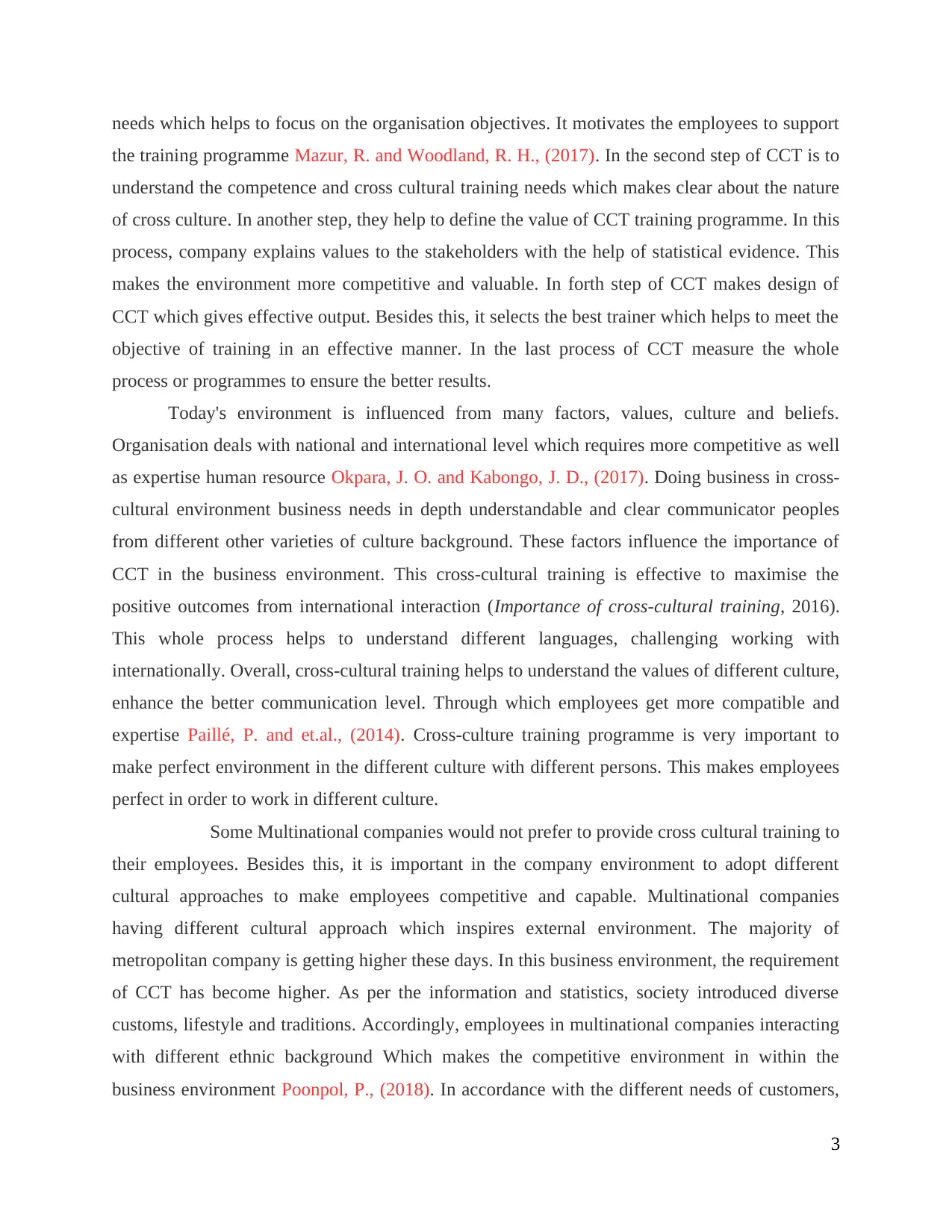
needs which helps to focus on the organisation objectives. It motivates the employees to support
the training programme Mazur, R. and Woodland, R. H., (2017). In the second step of CCT is to
understand the competence and cross cultural training needs which makes clear about the nature
of cross culture. In another step, they help to define the value of CCT training programme. In this
process, company explains values to the stakeholders with the help of statistical evidence. This
makes the environment more competitive and valuable. In forth step of CCT makes design of
CCT which gives effective output. Besides this, it selects the best trainer which helps to meet the
objective of training in an effective manner. In the last process of CCT measure the whole
process or programmes to ensure the better results.
Today's environment is influenced from many factors, values, culture and beliefs.
Organisation deals with national and international level which requires more competitive as well
as expertise human resource Okpara, J. O. and Kabongo, J. D., (2017). Doing business in cross-
cultural environment business needs in depth understandable and clear communicator peoples
from different other varieties of culture background. These factors influence the importance of
CCT in the business environment. This cross-cultural training is effective to maximise the
positive outcomes from international interaction (Importance of cross-cultural training, 2016).
This whole process helps to understand different languages, challenging working with
internationally. Overall, cross-cultural training helps to understand the values of different culture,
enhance the better communication level. Through which employees get more compatible and
expertise Paillé, P. and et.al., (2014). Cross-culture training programme is very important to
make perfect environment in the different culture with different persons. This makes employees
perfect in order to work in different culture.
Some Multinational companies would not prefer to provide cross cultural training to
their employees. Besides this, it is important in the company environment to adopt different
cultural approaches to make employees competitive and capable. Multinational companies
having different cultural approach which inspires external environment. The majority of
metropolitan company is getting higher these days. In this business environment, the requirement
of CCT has become higher. As per the information and statistics, society introduced diverse
customs, lifestyle and traditions. Accordingly, employees in multinational companies interacting
with different ethnic background Which makes the competitive environment in within the
business environment Poonpol, P., (2018). In accordance with the different needs of customers,
3
the training programme Mazur, R. and Woodland, R. H., (2017). In the second step of CCT is to
understand the competence and cross cultural training needs which makes clear about the nature
of cross culture. In another step, they help to define the value of CCT training programme. In this
process, company explains values to the stakeholders with the help of statistical evidence. This
makes the environment more competitive and valuable. In forth step of CCT makes design of
CCT which gives effective output. Besides this, it selects the best trainer which helps to meet the
objective of training in an effective manner. In the last process of CCT measure the whole
process or programmes to ensure the better results.
Today's environment is influenced from many factors, values, culture and beliefs.
Organisation deals with national and international level which requires more competitive as well
as expertise human resource Okpara, J. O. and Kabongo, J. D., (2017). Doing business in cross-
cultural environment business needs in depth understandable and clear communicator peoples
from different other varieties of culture background. These factors influence the importance of
CCT in the business environment. This cross-cultural training is effective to maximise the
positive outcomes from international interaction (Importance of cross-cultural training, 2016).
This whole process helps to understand different languages, challenging working with
internationally. Overall, cross-cultural training helps to understand the values of different culture,
enhance the better communication level. Through which employees get more compatible and
expertise Paillé, P. and et.al., (2014). Cross-culture training programme is very important to
make perfect environment in the different culture with different persons. This makes employees
perfect in order to work in different culture.
Some Multinational companies would not prefer to provide cross cultural training to
their employees. Besides this, it is important in the company environment to adopt different
cultural approaches to make employees competitive and capable. Multinational companies
having different cultural approach which inspires external environment. The majority of
metropolitan company is getting higher these days. In this business environment, the requirement
of CCT has become higher. As per the information and statistics, society introduced diverse
customs, lifestyle and traditions. Accordingly, employees in multinational companies interacting
with different ethnic background Which makes the competitive environment in within the
business environment Poonpol, P., (2018). In accordance with the different needs of customers,
3
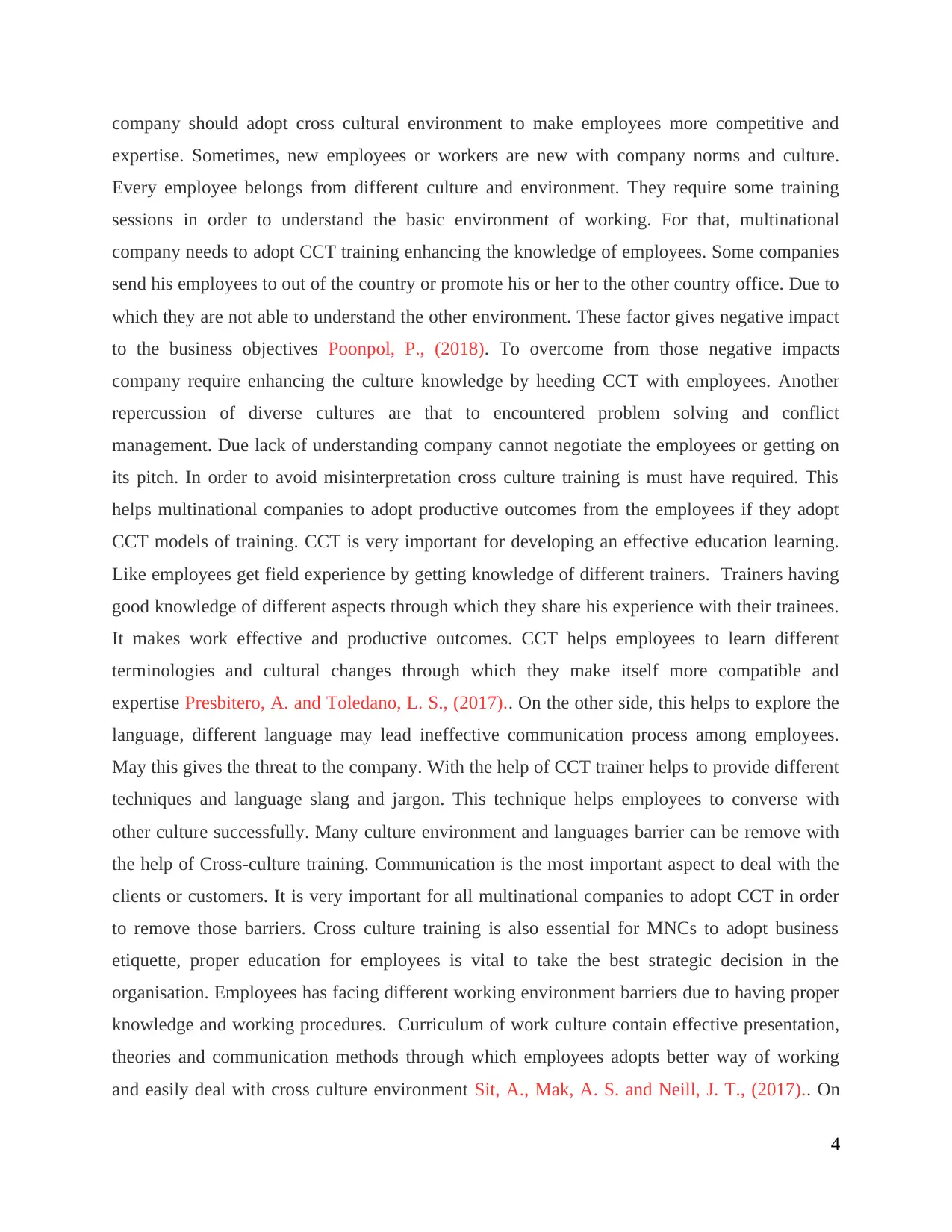
company should adopt cross cultural environment to make employees more competitive and
expertise. Sometimes, new employees or workers are new with company norms and culture.
Every employee belongs from different culture and environment. They require some training
sessions in order to understand the basic environment of working. For that, multinational
company needs to adopt CCT training enhancing the knowledge of employees. Some companies
send his employees to out of the country or promote his or her to the other country office. Due to
which they are not able to understand the other environment. These factor gives negative impact
to the business objectives Poonpol, P., (2018). To overcome from those negative impacts
company require enhancing the culture knowledge by heeding CCT with employees. Another
repercussion of diverse cultures are that to encountered problem solving and conflict
management. Due lack of understanding company cannot negotiate the employees or getting on
its pitch. In order to avoid misinterpretation cross culture training is must have required. This
helps multinational companies to adopt productive outcomes from the employees if they adopt
CCT models of training. CCT is very important for developing an effective education learning.
Like employees get field experience by getting knowledge of different trainers. Trainers having
good knowledge of different aspects through which they share his experience with their trainees.
It makes work effective and productive outcomes. CCT helps employees to learn different
terminologies and cultural changes through which they make itself more compatible and
expertise Presbitero, A. and Toledano, L. S., (2017).. On the other side, this helps to explore the
language, different language may lead ineffective communication process among employees.
May this gives the threat to the company. With the help of CCT trainer helps to provide different
techniques and language slang and jargon. This technique helps employees to converse with
other culture successfully. Many culture environment and languages barrier can be remove with
the help of Cross-culture training. Communication is the most important aspect to deal with the
clients or customers. It is very important for all multinational companies to adopt CCT in order
to remove those barriers. Cross culture training is also essential for MNCs to adopt business
etiquette, proper education for employees is vital to take the best strategic decision in the
organisation. Employees has facing different working environment barriers due to having proper
knowledge and working procedures. Curriculum of work culture contain effective presentation,
theories and communication methods through which employees adopts better way of working
and easily deal with cross culture environment Sit, A., Mak, A. S. and Neill, J. T., (2017).. On
4
expertise. Sometimes, new employees or workers are new with company norms and culture.
Every employee belongs from different culture and environment. They require some training
sessions in order to understand the basic environment of working. For that, multinational
company needs to adopt CCT training enhancing the knowledge of employees. Some companies
send his employees to out of the country or promote his or her to the other country office. Due to
which they are not able to understand the other environment. These factor gives negative impact
to the business objectives Poonpol, P., (2018). To overcome from those negative impacts
company require enhancing the culture knowledge by heeding CCT with employees. Another
repercussion of diverse cultures are that to encountered problem solving and conflict
management. Due lack of understanding company cannot negotiate the employees or getting on
its pitch. In order to avoid misinterpretation cross culture training is must have required. This
helps multinational companies to adopt productive outcomes from the employees if they adopt
CCT models of training. CCT is very important for developing an effective education learning.
Like employees get field experience by getting knowledge of different trainers. Trainers having
good knowledge of different aspects through which they share his experience with their trainees.
It makes work effective and productive outcomes. CCT helps employees to learn different
terminologies and cultural changes through which they make itself more compatible and
expertise Presbitero, A. and Toledano, L. S., (2017).. On the other side, this helps to explore the
language, different language may lead ineffective communication process among employees.
May this gives the threat to the company. With the help of CCT trainer helps to provide different
techniques and language slang and jargon. This technique helps employees to converse with
other culture successfully. Many culture environment and languages barrier can be remove with
the help of Cross-culture training. Communication is the most important aspect to deal with the
clients or customers. It is very important for all multinational companies to adopt CCT in order
to remove those barriers. Cross culture training is also essential for MNCs to adopt business
etiquette, proper education for employees is vital to take the best strategic decision in the
organisation. Employees has facing different working environment barriers due to having proper
knowledge and working procedures. Curriculum of work culture contain effective presentation,
theories and communication methods through which employees adopts better way of working
and easily deal with cross culture environment Sit, A., Mak, A. S. and Neill, J. T., (2017).. On
4
⊘ This is a preview!⊘
Do you want full access?
Subscribe today to unlock all pages.

Trusted by 1+ million students worldwide
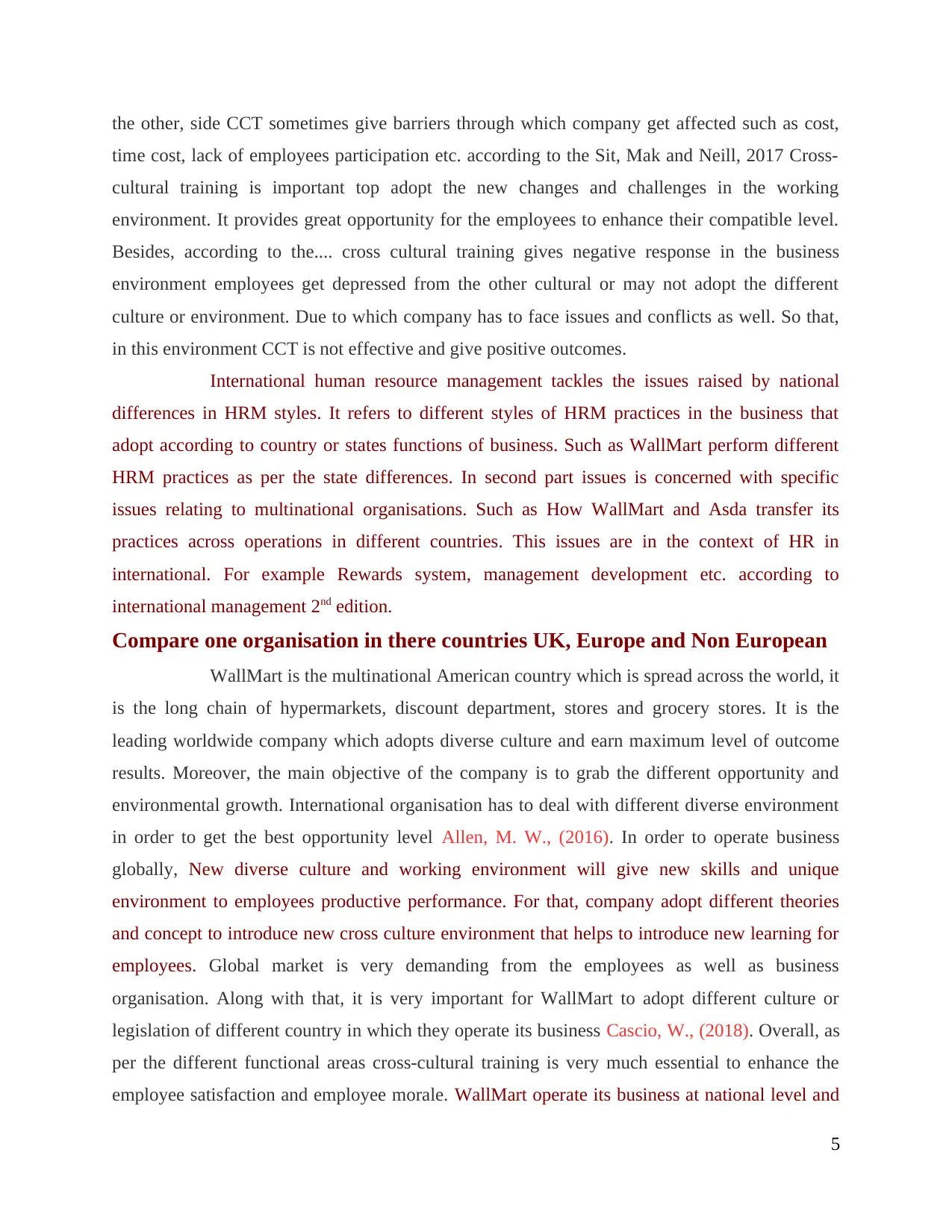
the other, side CCT sometimes give barriers through which company get affected such as cost,
time cost, lack of employees participation etc. according to the Sit, Mak and Neill, 2017 Cross-
cultural training is important top adopt the new changes and challenges in the working
environment. It provides great opportunity for the employees to enhance their compatible level.
Besides, according to the.... cross cultural training gives negative response in the business
environment employees get depressed from the other cultural or may not adopt the different
culture or environment. Due to which company has to face issues and conflicts as well. So that,
in this environment CCT is not effective and give positive outcomes.
International human resource management tackles the issues raised by national
differences in HRM styles. It refers to different styles of HRM practices in the business that
adopt according to country or states functions of business. Such as WallMart perform different
HRM practices as per the state differences. In second part issues is concerned with specific
issues relating to multinational organisations. Such as How WallMart and Asda transfer its
practices across operations in different countries. This issues are in the context of HR in
international. For example Rewards system, management development etc. according to
international management 2nd edition.
Compare one organisation in there countries UK, Europe and Non European
WallMart is the multinational American country which is spread across the world, it
is the long chain of hypermarkets, discount department, stores and grocery stores. It is the
leading worldwide company which adopts diverse culture and earn maximum level of outcome
results. Moreover, the main objective of the company is to grab the different opportunity and
environmental growth. International organisation has to deal with different diverse environment
in order to get the best opportunity level Allen, M. W., (2016). In order to operate business
globally, New diverse culture and working environment will give new skills and unique
environment to employees productive performance. For that, company adopt different theories
and concept to introduce new cross culture environment that helps to introduce new learning for
employees. Global market is very demanding from the employees as well as business
organisation. Along with that, it is very important for WallMart to adopt different culture or
legislation of different country in which they operate its business Cascio, W., (2018). Overall, as
per the different functional areas cross-cultural training is very much essential to enhance the
employee satisfaction and employee morale. WallMart operate its business at national level and
5
time cost, lack of employees participation etc. according to the Sit, Mak and Neill, 2017 Cross-
cultural training is important top adopt the new changes and challenges in the working
environment. It provides great opportunity for the employees to enhance their compatible level.
Besides, according to the.... cross cultural training gives negative response in the business
environment employees get depressed from the other cultural or may not adopt the different
culture or environment. Due to which company has to face issues and conflicts as well. So that,
in this environment CCT is not effective and give positive outcomes.
International human resource management tackles the issues raised by national
differences in HRM styles. It refers to different styles of HRM practices in the business that
adopt according to country or states functions of business. Such as WallMart perform different
HRM practices as per the state differences. In second part issues is concerned with specific
issues relating to multinational organisations. Such as How WallMart and Asda transfer its
practices across operations in different countries. This issues are in the context of HR in
international. For example Rewards system, management development etc. according to
international management 2nd edition.
Compare one organisation in there countries UK, Europe and Non European
WallMart is the multinational American country which is spread across the world, it
is the long chain of hypermarkets, discount department, stores and grocery stores. It is the
leading worldwide company which adopts diverse culture and earn maximum level of outcome
results. Moreover, the main objective of the company is to grab the different opportunity and
environmental growth. International organisation has to deal with different diverse environment
in order to get the best opportunity level Allen, M. W., (2016). In order to operate business
globally, New diverse culture and working environment will give new skills and unique
environment to employees productive performance. For that, company adopt different theories
and concept to introduce new cross culture environment that helps to introduce new learning for
employees. Global market is very demanding from the employees as well as business
organisation. Along with that, it is very important for WallMart to adopt different culture or
legislation of different country in which they operate its business Cascio, W., (2018). Overall, as
per the different functional areas cross-cultural training is very much essential to enhance the
employee satisfaction and employee morale. WallMart operate its business at national level and
5
Paraphrase This Document
Need a fresh take? Get an instant paraphrase of this document with our AI Paraphraser
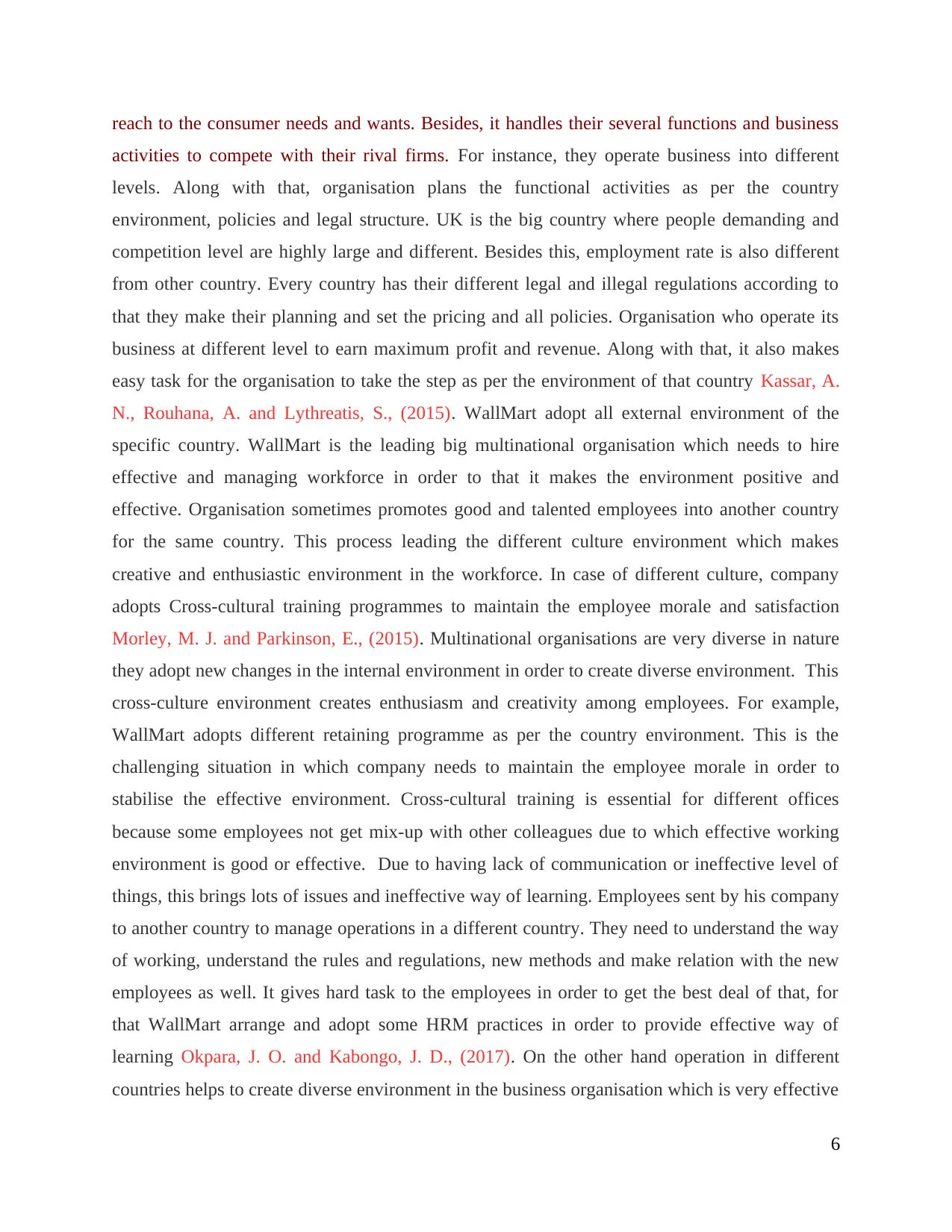
reach to the consumer needs and wants. Besides, it handles their several functions and business
activities to compete with their rival firms. For instance, they operate business into different
levels. Along with that, organisation plans the functional activities as per the country
environment, policies and legal structure. UK is the big country where people demanding and
competition level are highly large and different. Besides this, employment rate is also different
from other country. Every country has their different legal and illegal regulations according to
that they make their planning and set the pricing and all policies. Organisation who operate its
business at different level to earn maximum profit and revenue. Along with that, it also makes
easy task for the organisation to take the step as per the environment of that country Kassar, A.
N., Rouhana, A. and Lythreatis, S., (2015). WallMart adopt all external environment of the
specific country. WallMart is the leading big multinational organisation which needs to hire
effective and managing workforce in order to that it makes the environment positive and
effective. Organisation sometimes promotes good and talented employees into another country
for the same country. This process leading the different culture environment which makes
creative and enthusiastic environment in the workforce. In case of different culture, company
adopts Cross-cultural training programmes to maintain the employee morale and satisfaction
Morley, M. J. and Parkinson, E., (2015). Multinational organisations are very diverse in nature
they adopt new changes in the internal environment in order to create diverse environment. This
cross-culture environment creates enthusiasm and creativity among employees. For example,
WallMart adopts different retaining programme as per the country environment. This is the
challenging situation in which company needs to maintain the employee morale in order to
stabilise the effective environment. Cross-cultural training is essential for different offices
because some employees not get mix-up with other colleagues due to which effective working
environment is good or effective. Due to having lack of communication or ineffective level of
things, this brings lots of issues and ineffective way of learning. Employees sent by his company
to another country to manage operations in a different country. They need to understand the way
of working, understand the rules and regulations, new methods and make relation with the new
employees as well. It gives hard task to the employees in order to get the best deal of that, for
that WallMart arrange and adopt some HRM practices in order to provide effective way of
learning Okpara, J. O. and Kabongo, J. D., (2017). On the other hand operation in different
countries helps to create diverse environment in the business organisation which is very effective
6
activities to compete with their rival firms. For instance, they operate business into different
levels. Along with that, organisation plans the functional activities as per the country
environment, policies and legal structure. UK is the big country where people demanding and
competition level are highly large and different. Besides this, employment rate is also different
from other country. Every country has their different legal and illegal regulations according to
that they make their planning and set the pricing and all policies. Organisation who operate its
business at different level to earn maximum profit and revenue. Along with that, it also makes
easy task for the organisation to take the step as per the environment of that country Kassar, A.
N., Rouhana, A. and Lythreatis, S., (2015). WallMart adopt all external environment of the
specific country. WallMart is the leading big multinational organisation which needs to hire
effective and managing workforce in order to that it makes the environment positive and
effective. Organisation sometimes promotes good and talented employees into another country
for the same country. This process leading the different culture environment which makes
creative and enthusiastic environment in the workforce. In case of different culture, company
adopts Cross-cultural training programmes to maintain the employee morale and satisfaction
Morley, M. J. and Parkinson, E., (2015). Multinational organisations are very diverse in nature
they adopt new changes in the internal environment in order to create diverse environment. This
cross-culture environment creates enthusiasm and creativity among employees. For example,
WallMart adopts different retaining programme as per the country environment. This is the
challenging situation in which company needs to maintain the employee morale in order to
stabilise the effective environment. Cross-cultural training is essential for different offices
because some employees not get mix-up with other colleagues due to which effective working
environment is good or effective. Due to having lack of communication or ineffective level of
things, this brings lots of issues and ineffective way of learning. Employees sent by his company
to another country to manage operations in a different country. They need to understand the way
of working, understand the rules and regulations, new methods and make relation with the new
employees as well. It gives hard task to the employees in order to get the best deal of that, for
that WallMart arrange and adopt some HRM practices in order to provide effective way of
learning Okpara, J. O. and Kabongo, J. D., (2017). On the other hand operation in different
countries helps to create diverse environment in the business organisation which is very effective
6
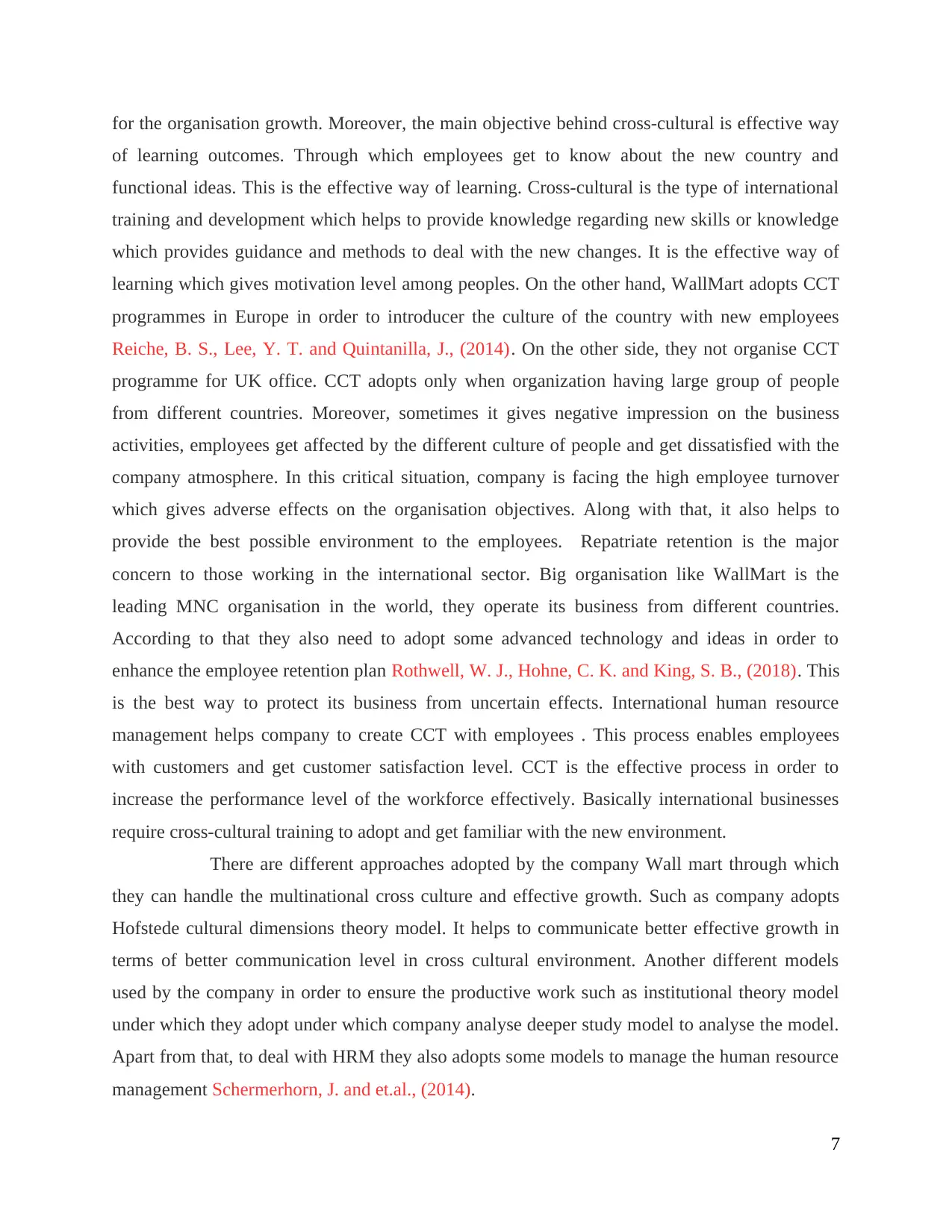
for the organisation growth. Moreover, the main objective behind cross-cultural is effective way
of learning outcomes. Through which employees get to know about the new country and
functional ideas. This is the effective way of learning. Cross-cultural is the type of international
training and development which helps to provide knowledge regarding new skills or knowledge
which provides guidance and methods to deal with the new changes. It is the effective way of
learning which gives motivation level among peoples. On the other hand, WallMart adopts CCT
programmes in Europe in order to introducer the culture of the country with new employees
Reiche, B. S., Lee, Y. T. and Quintanilla, J., (2014). On the other side, they not organise CCT
programme for UK office. CCT adopts only when organization having large group of people
from different countries. Moreover, sometimes it gives negative impression on the business
activities, employees get affected by the different culture of people and get dissatisfied with the
company atmosphere. In this critical situation, company is facing the high employee turnover
which gives adverse effects on the organisation objectives. Along with that, it also helps to
provide the best possible environment to the employees. Repatriate retention is the major
concern to those working in the international sector. Big organisation like WallMart is the
leading MNC organisation in the world, they operate its business from different countries.
According to that they also need to adopt some advanced technology and ideas in order to
enhance the employee retention plan Rothwell, W. J., Hohne, C. K. and King, S. B., (2018). This
is the best way to protect its business from uncertain effects. International human resource
management helps company to create CCT with employees . This process enables employees
with customers and get customer satisfaction level. CCT is the effective process in order to
increase the performance level of the workforce effectively. Basically international businesses
require cross-cultural training to adopt and get familiar with the new environment.
There are different approaches adopted by the company Wall mart through which
they can handle the multinational cross culture and effective growth. Such as company adopts
Hofstede cultural dimensions theory model. It helps to communicate better effective growth in
terms of better communication level in cross cultural environment. Another different models
used by the company in order to ensure the productive work such as institutional theory model
under which they adopt under which company analyse deeper study model to analyse the model.
Apart from that, to deal with HRM they also adopts some models to manage the human resource
management Schermerhorn, J. and et.al., (2014).
7
of learning outcomes. Through which employees get to know about the new country and
functional ideas. This is the effective way of learning. Cross-cultural is the type of international
training and development which helps to provide knowledge regarding new skills or knowledge
which provides guidance and methods to deal with the new changes. It is the effective way of
learning which gives motivation level among peoples. On the other hand, WallMart adopts CCT
programmes in Europe in order to introducer the culture of the country with new employees
Reiche, B. S., Lee, Y. T. and Quintanilla, J., (2014). On the other side, they not organise CCT
programme for UK office. CCT adopts only when organization having large group of people
from different countries. Moreover, sometimes it gives negative impression on the business
activities, employees get affected by the different culture of people and get dissatisfied with the
company atmosphere. In this critical situation, company is facing the high employee turnover
which gives adverse effects on the organisation objectives. Along with that, it also helps to
provide the best possible environment to the employees. Repatriate retention is the major
concern to those working in the international sector. Big organisation like WallMart is the
leading MNC organisation in the world, they operate its business from different countries.
According to that they also need to adopt some advanced technology and ideas in order to
enhance the employee retention plan Rothwell, W. J., Hohne, C. K. and King, S. B., (2018). This
is the best way to protect its business from uncertain effects. International human resource
management helps company to create CCT with employees . This process enables employees
with customers and get customer satisfaction level. CCT is the effective process in order to
increase the performance level of the workforce effectively. Basically international businesses
require cross-cultural training to adopt and get familiar with the new environment.
There are different approaches adopted by the company Wall mart through which
they can handle the multinational cross culture and effective growth. Such as company adopts
Hofstede cultural dimensions theory model. It helps to communicate better effective growth in
terms of better communication level in cross cultural environment. Another different models
used by the company in order to ensure the productive work such as institutional theory model
under which they adopt under which company analyse deeper study model to analyse the model.
Apart from that, to deal with HRM they also adopts some models to manage the human resource
management Schermerhorn, J. and et.al., (2014).
7
⊘ This is a preview!⊘
Do you want full access?
Subscribe today to unlock all pages.

Trusted by 1+ million students worldwide
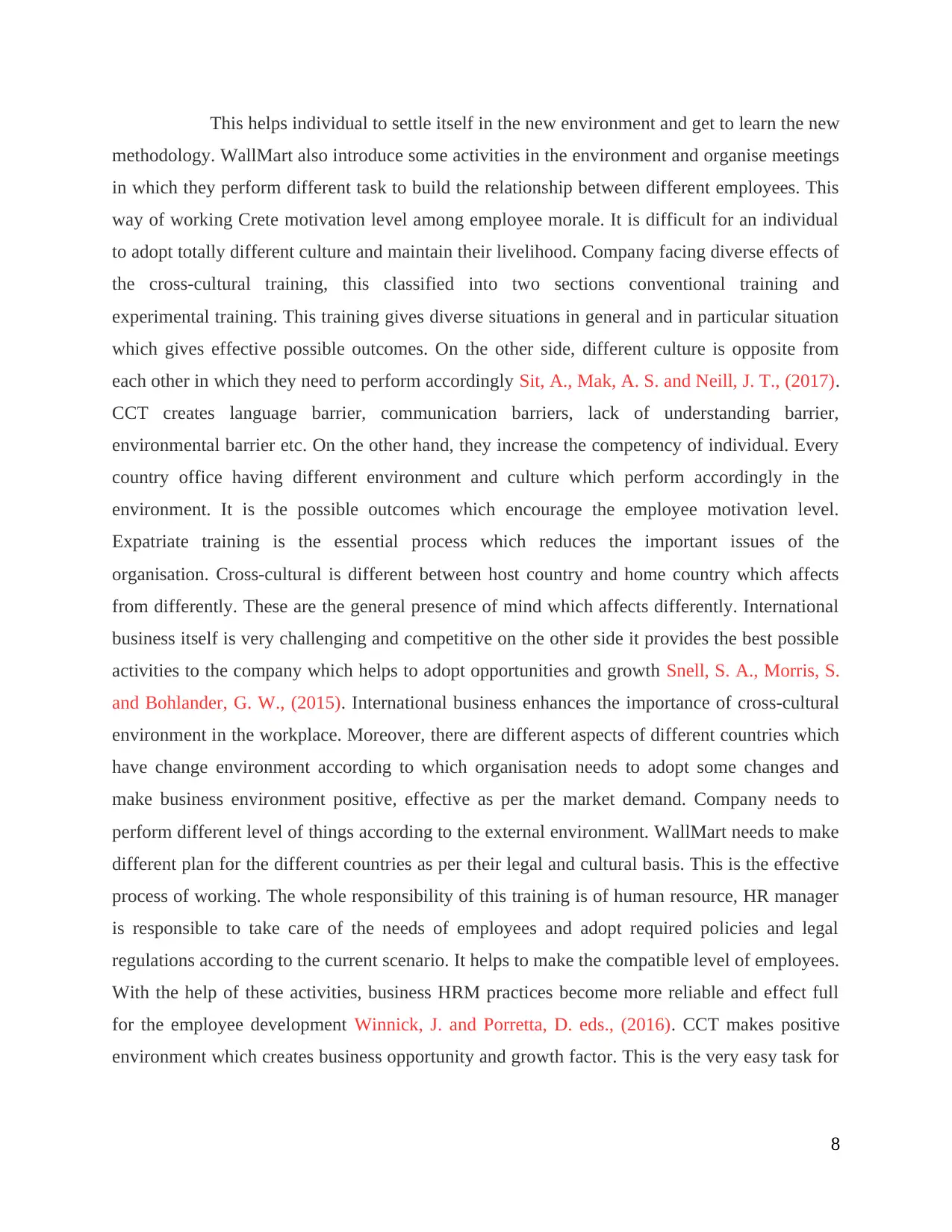
This helps individual to settle itself in the new environment and get to learn the new
methodology. WallMart also introduce some activities in the environment and organise meetings
in which they perform different task to build the relationship between different employees. This
way of working Crete motivation level among employee morale. It is difficult for an individual
to adopt totally different culture and maintain their livelihood. Company facing diverse effects of
the cross-cultural training, this classified into two sections conventional training and
experimental training. This training gives diverse situations in general and in particular situation
which gives effective possible outcomes. On the other side, different culture is opposite from
each other in which they need to perform accordingly Sit, A., Mak, A. S. and Neill, J. T., (2017).
CCT creates language barrier, communication barriers, lack of understanding barrier,
environmental barrier etc. On the other hand, they increase the competency of individual. Every
country office having different environment and culture which perform accordingly in the
environment. It is the possible outcomes which encourage the employee motivation level.
Expatriate training is the essential process which reduces the important issues of the
organisation. Cross-cultural is different between host country and home country which affects
from differently. These are the general presence of mind which affects differently. International
business itself is very challenging and competitive on the other side it provides the best possible
activities to the company which helps to adopt opportunities and growth Snell, S. A., Morris, S.
and Bohlander, G. W., (2015). International business enhances the importance of cross-cultural
environment in the workplace. Moreover, there are different aspects of different countries which
have change environment according to which organisation needs to adopt some changes and
make business environment positive, effective as per the market demand. Company needs to
perform different level of things according to the external environment. WallMart needs to make
different plan for the different countries as per their legal and cultural basis. This is the effective
process of working. The whole responsibility of this training is of human resource, HR manager
is responsible to take care of the needs of employees and adopt required policies and legal
regulations according to the current scenario. It helps to make the compatible level of employees.
With the help of these activities, business HRM practices become more reliable and effect full
for the employee development Winnick, J. and Porretta, D. eds., (2016). CCT makes positive
environment which creates business opportunity and growth factor. This is the very easy task for
8
methodology. WallMart also introduce some activities in the environment and organise meetings
in which they perform different task to build the relationship between different employees. This
way of working Crete motivation level among employee morale. It is difficult for an individual
to adopt totally different culture and maintain their livelihood. Company facing diverse effects of
the cross-cultural training, this classified into two sections conventional training and
experimental training. This training gives diverse situations in general and in particular situation
which gives effective possible outcomes. On the other side, different culture is opposite from
each other in which they need to perform accordingly Sit, A., Mak, A. S. and Neill, J. T., (2017).
CCT creates language barrier, communication barriers, lack of understanding barrier,
environmental barrier etc. On the other hand, they increase the competency of individual. Every
country office having different environment and culture which perform accordingly in the
environment. It is the possible outcomes which encourage the employee motivation level.
Expatriate training is the essential process which reduces the important issues of the
organisation. Cross-cultural is different between host country and home country which affects
from differently. These are the general presence of mind which affects differently. International
business itself is very challenging and competitive on the other side it provides the best possible
activities to the company which helps to adopt opportunities and growth Snell, S. A., Morris, S.
and Bohlander, G. W., (2015). International business enhances the importance of cross-cultural
environment in the workplace. Moreover, there are different aspects of different countries which
have change environment according to which organisation needs to adopt some changes and
make business environment positive, effective as per the market demand. Company needs to
perform different level of things according to the external environment. WallMart needs to make
different plan for the different countries as per their legal and cultural basis. This is the effective
process of working. The whole responsibility of this training is of human resource, HR manager
is responsible to take care of the needs of employees and adopt required policies and legal
regulations according to the current scenario. It helps to make the compatible level of employees.
With the help of these activities, business HRM practices become more reliable and effect full
for the employee development Winnick, J. and Porretta, D. eds., (2016). CCT makes positive
environment which creates business opportunity and growth factor. This is the very easy task for
8
Paraphrase This Document
Need a fresh take? Get an instant paraphrase of this document with our AI Paraphraser
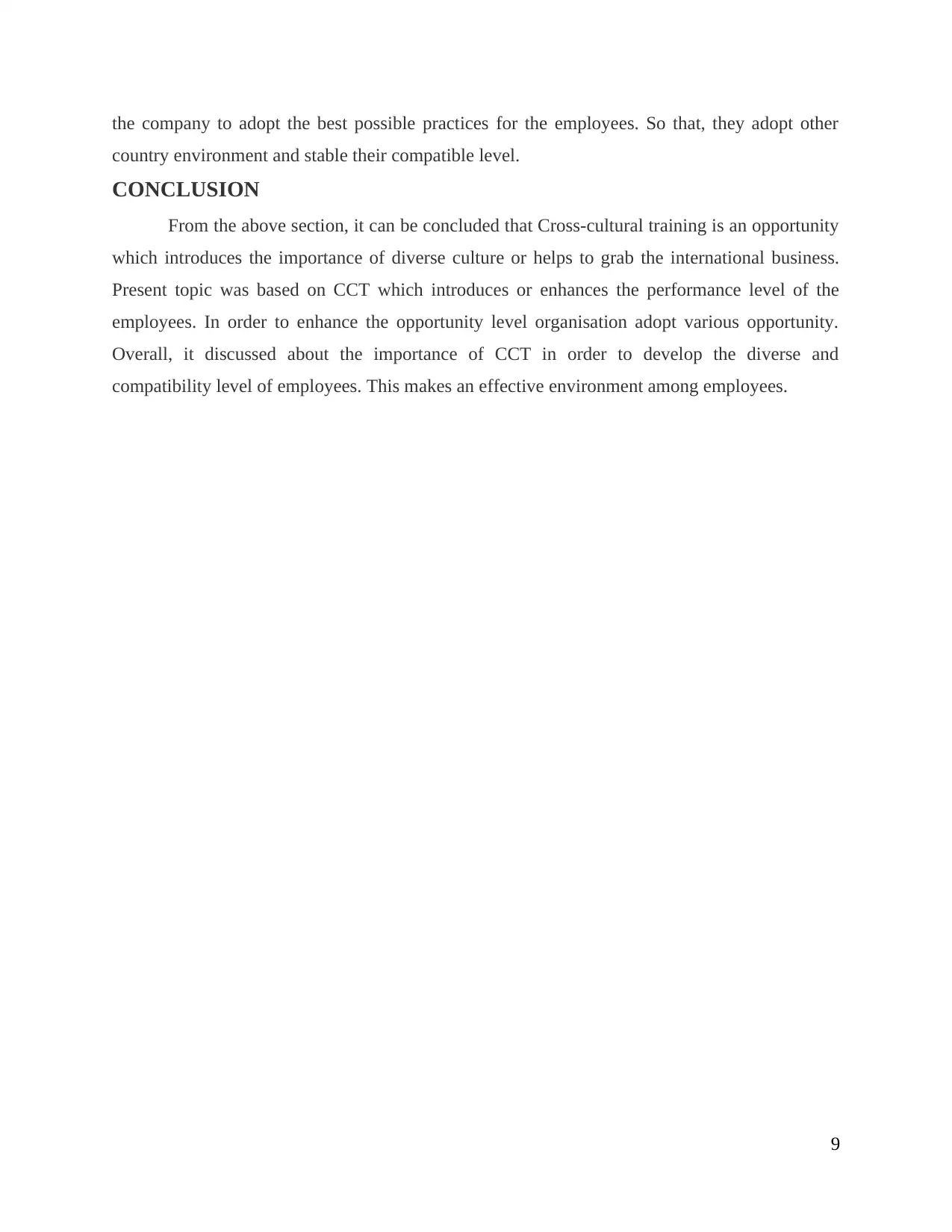
the company to adopt the best possible practices for the employees. So that, they adopt other
country environment and stable their compatible level.
CONCLUSION
From the above section, it can be concluded that Cross-cultural training is an opportunity
which introduces the importance of diverse culture or helps to grab the international business.
Present topic was based on CCT which introduces or enhances the performance level of the
employees. In order to enhance the opportunity level organisation adopt various opportunity.
Overall, it discussed about the importance of CCT in order to develop the diverse and
compatibility level of employees. This makes an effective environment among employees.
9
country environment and stable their compatible level.
CONCLUSION
From the above section, it can be concluded that Cross-cultural training is an opportunity
which introduces the importance of diverse culture or helps to grab the international business.
Present topic was based on CCT which introduces or enhances the performance level of the
employees. In order to enhance the opportunity level organisation adopt various opportunity.
Overall, it discussed about the importance of CCT in order to develop the diverse and
compatibility level of employees. This makes an effective environment among employees.
9
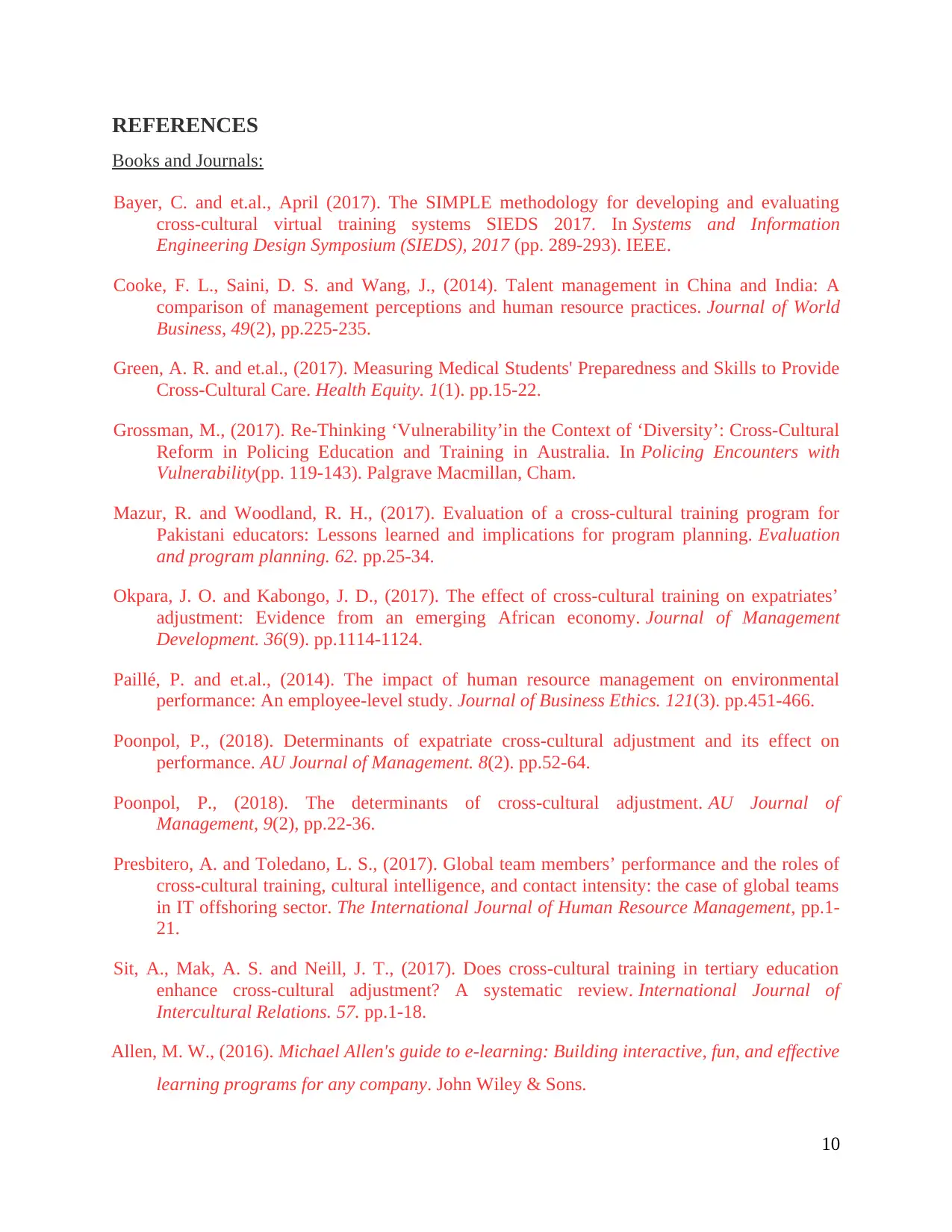
REFERENCES
Books and Journals:
Bayer, C. and et.al., April (2017). The SIMPLE methodology for developing and evaluating
cross-cultural virtual training systems SIEDS 2017. In Systems and Information
Engineering Design Symposium (SIEDS), 2017 (pp. 289-293). IEEE.
Cooke, F. L., Saini, D. S. and Wang, J., (2014). Talent management in China and India: A
comparison of management perceptions and human resource practices. Journal of World
Business, 49(2), pp.225-235.
Green, A. R. and et.al., (2017). Measuring Medical Students' Preparedness and Skills to Provide
Cross-Cultural Care. Health Equity. 1(1). pp.15-22.
Grossman, M., (2017). Re-Thinking ‘Vulnerability’in the Context of ‘Diversity’: Cross-Cultural
Reform in Policing Education and Training in Australia. In Policing Encounters with
Vulnerability(pp. 119-143). Palgrave Macmillan, Cham.
Mazur, R. and Woodland, R. H., (2017). Evaluation of a cross-cultural training program for
Pakistani educators: Lessons learned and implications for program planning. Evaluation
and program planning. 62. pp.25-34.
Okpara, J. O. and Kabongo, J. D., (2017). The effect of cross-cultural training on expatriates’
adjustment: Evidence from an emerging African economy. Journal of Management
Development. 36(9). pp.1114-1124.
Paillé, P. and et.al., (2014). The impact of human resource management on environmental
performance: An employee-level study. Journal of Business Ethics. 121(3). pp.451-466.
Poonpol, P., (2018). Determinants of expatriate cross-cultural adjustment and its effect on
performance. AU Journal of Management. 8(2). pp.52-64.
Poonpol, P., (2018). The determinants of cross-cultural adjustment. AU Journal of
Management, 9(2), pp.22-36.
Presbitero, A. and Toledano, L. S., (2017). Global team members’ performance and the roles of
cross-cultural training, cultural intelligence, and contact intensity: the case of global teams
in IT offshoring sector. The International Journal of Human Resource Management, pp.1-
21.
Sit, A., Mak, A. S. and Neill, J. T., (2017). Does cross-cultural training in tertiary education
enhance cross-cultural adjustment? A systematic review. International Journal of
Intercultural Relations. 57. pp.1-18.
Allen, M. W., (2016). Michael Allen's guide to e-learning: Building interactive, fun, and effective
learning programs for any company. John Wiley & Sons.
10
Books and Journals:
Bayer, C. and et.al., April (2017). The SIMPLE methodology for developing and evaluating
cross-cultural virtual training systems SIEDS 2017. In Systems and Information
Engineering Design Symposium (SIEDS), 2017 (pp. 289-293). IEEE.
Cooke, F. L., Saini, D. S. and Wang, J., (2014). Talent management in China and India: A
comparison of management perceptions and human resource practices. Journal of World
Business, 49(2), pp.225-235.
Green, A. R. and et.al., (2017). Measuring Medical Students' Preparedness and Skills to Provide
Cross-Cultural Care. Health Equity. 1(1). pp.15-22.
Grossman, M., (2017). Re-Thinking ‘Vulnerability’in the Context of ‘Diversity’: Cross-Cultural
Reform in Policing Education and Training in Australia. In Policing Encounters with
Vulnerability(pp. 119-143). Palgrave Macmillan, Cham.
Mazur, R. and Woodland, R. H., (2017). Evaluation of a cross-cultural training program for
Pakistani educators: Lessons learned and implications for program planning. Evaluation
and program planning. 62. pp.25-34.
Okpara, J. O. and Kabongo, J. D., (2017). The effect of cross-cultural training on expatriates’
adjustment: Evidence from an emerging African economy. Journal of Management
Development. 36(9). pp.1114-1124.
Paillé, P. and et.al., (2014). The impact of human resource management on environmental
performance: An employee-level study. Journal of Business Ethics. 121(3). pp.451-466.
Poonpol, P., (2018). Determinants of expatriate cross-cultural adjustment and its effect on
performance. AU Journal of Management. 8(2). pp.52-64.
Poonpol, P., (2018). The determinants of cross-cultural adjustment. AU Journal of
Management, 9(2), pp.22-36.
Presbitero, A. and Toledano, L. S., (2017). Global team members’ performance and the roles of
cross-cultural training, cultural intelligence, and contact intensity: the case of global teams
in IT offshoring sector. The International Journal of Human Resource Management, pp.1-
21.
Sit, A., Mak, A. S. and Neill, J. T., (2017). Does cross-cultural training in tertiary education
enhance cross-cultural adjustment? A systematic review. International Journal of
Intercultural Relations. 57. pp.1-18.
Allen, M. W., (2016). Michael Allen's guide to e-learning: Building interactive, fun, and effective
learning programs for any company. John Wiley & Sons.
10
⊘ This is a preview!⊘
Do you want full access?
Subscribe today to unlock all pages.

Trusted by 1+ million students worldwide
1 out of 14
Related Documents
Your All-in-One AI-Powered Toolkit for Academic Success.
+13062052269
info@desklib.com
Available 24*7 on WhatsApp / Email
![[object Object]](/_next/static/media/star-bottom.7253800d.svg)
Unlock your academic potential
Copyright © 2020–2026 A2Z Services. All Rights Reserved. Developed and managed by ZUCOL.





